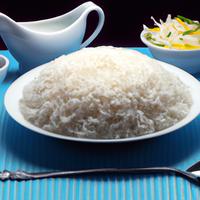
1 serving (100 grams) contains 130 calories, 2.7 grams of protein, 0.3 grams of fat, and 28.2 grams of carbohydrates.

Log this food in SnapCalorie

Nutrition Information
Calories |
260 | ||
|---|---|---|---|
% Daily Value* |
|||
| Total Fat | 0.6 g | 0% | |
| Saturated Fat | 0.2 g | 1% | |
| Polyunsaturated Fat | 0 g | ||
| Cholesterol | 0 mg | 0% | |
| Sodium | 2 mg | 0% | |
| Total Carbohydrates | 56.4 g | 20% | |
| Dietary Fiber | 0.8 g | 2% | |
| Sugars | 0.2 g | ||
| protein | 5.4 g | 10% | |
| Vitamin D | 0 mcg | 0% | |
| Calcium | 20 mg | 1% | |
| Iron | 0.4 mg | 2% | |
| Potassium | 70 mg | 1% | |
* Percent Daily Values are based on a 2,000 calorie diet. Your daily values may be higher or lower depending on your calorie needs.
Food Attributes
Source of Calories
About Portion white rice
White rice is a versatile and staple grain derived from the husked and polished seeds of the rice plant. Predominantly featured in cuisines worldwide, including Asian, Latin American, and Middle Eastern dishes, white rice is mild in flavor, serving as a base for countless recipes. It provides a source of carbohydrates, essential for energy, and contains small amounts of vitamins like B6 and minerals such as magnesium and iron. While it’s less nutrient-dense than brown rice due to the removal of the bran and germ layers during processing, white rice is low in fat and naturally gluten-free. It is easy to digest, making it a suitable option for those with sensitive stomachs or recovering from illness. Moderation is key, as its high glycemic index can cause blood sugar spikes. Pairing it with lean proteins and vegetables enhances its nutritional profile for a balanced meal.



